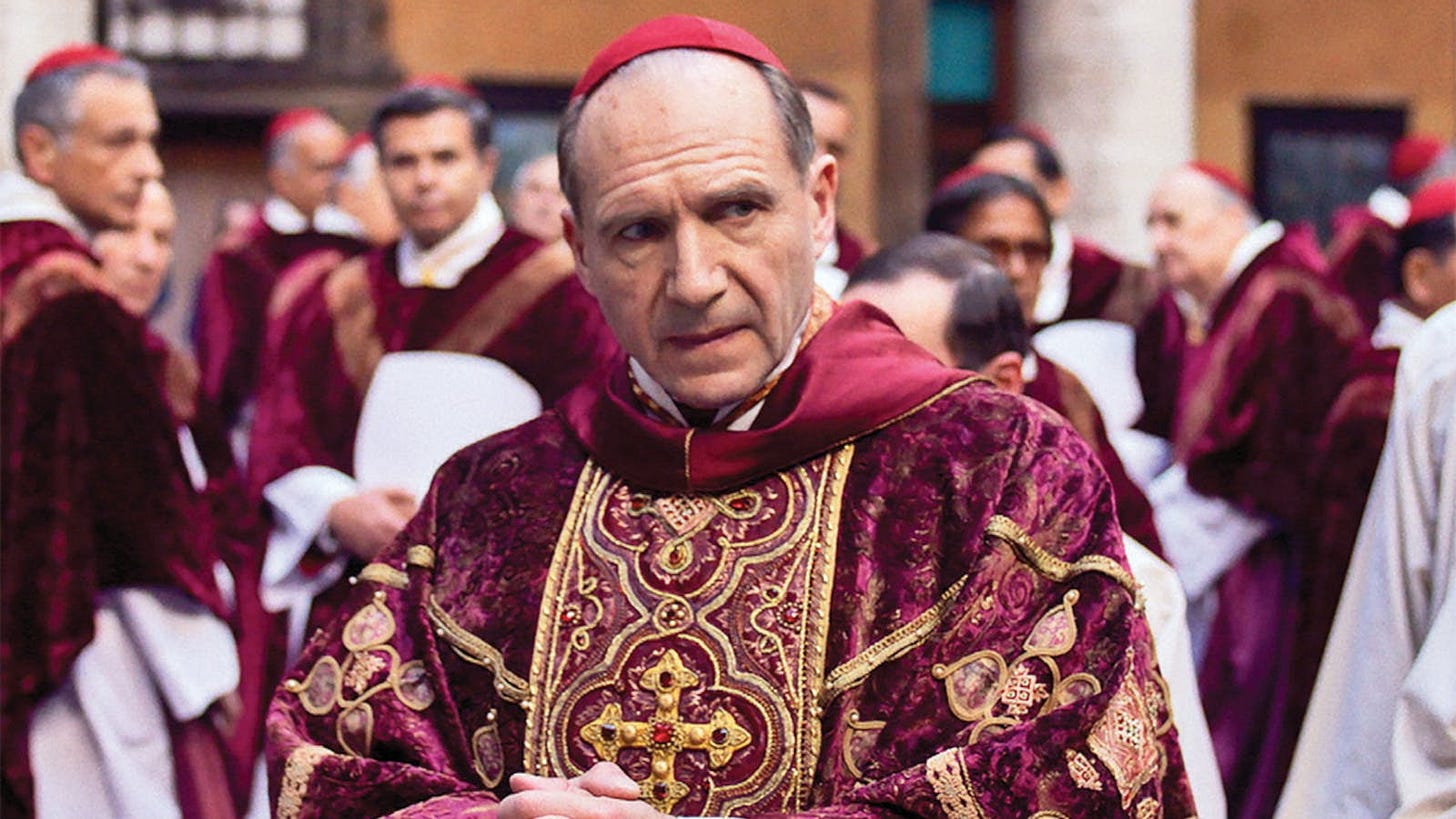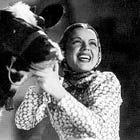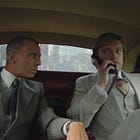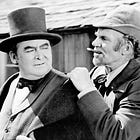Conclave
In its depiction of the Vatican in flux following the death of the Pope, Conclave explores the ideological schisms, political workings, and impact of scandal in the contemporary Catholic Church.

Please support my work by becoming a free or a paid subscriber to the newsletter. Paid subscribers can access my full archive of posts at any time, and are vital to me being able to continue producing and expanding this newsletter.
This post is part of the regular ‘One Take’ series analysing the politics of a film currently showing at the cinemas.
Content warning: Death and bereavement.
Note: Given that, at time of writing, Conclave is still showing in UK cinemas, this analysis only lays out as much of the film’s scenario as is necessary so as to avoid spoilers. It is therefore suitable to be read either before or after watching the film, while hopefully still enriching the viewer’s appreciation of it either way.
Conclave begins with the death of the Pope, with it falling to his close associate, the Englishman Thomas Lawrence (Ralph Fiennes), as Dean of the College of Cardinals to convene a papal conclave to elect his successor. The early favourites are Aldo Bellini (Stanley Tucci), a reluctant American candidate close to Lawrence and the deceased Pope, and like them from the liberal wing of the Church; the ambitious and insincere Canadian Joseph Tremblay (John Lithgow); the socially conservative Nigerian Joshua Adeyemi (Lucian Msamati); and the gregarious but deeply reactionary Italian Goffredo Tedesco (Sergio Castellitto).
The cardinals are sequestered in the Vatican, residing in the Domus Sanctae Marthae, with voting taking place in the Sistine Chapel; head nun Sister Agnes (Isabella Rossellini) taciturnly and watchfully oversees the conclave’s catering and hospitality. Cardinal Lawrence, wrestling with his own crisis of faith and grief at the former Pope’s death, finds proceedings immediately further complicated by unexpected developments. Archbishop Janusz Woźniak (Jacek Koman), Prefect of the Papal Household, alleges that the Pope confided in him that he had demanded Tremblay’s resignation at a meeting shortly before he died. There is also the surprise arrival of Vincent Benitez (Carlos Diehz), a Mexican cardinal hitherto unknown to the other cardinals, whom the last Pope had secretly made Archbishop of Kabul.
Lawrence and his fellow liberals line up behind Bellini, seeking to prevent Tedesco from attaining the papacy and reversing the progressive reforms of the past half-century. Yet with the successful candidate requiring the backing of at least two thirds of the other cardinals, and the conclave visibly marked by sharp personal and political cleavages, it will take several rounds of voting for the new Pope to be elected. Moreover, Lawrence learns of a series of scandals that threaten to derail proceedings, and irreparably damage the Catholic Church’s already fragile reputation.
Ideological schisms
The division at the heart of Conclave is one that we might well recognise as a version of the polarisation around social issues visible in most contemporary Western societies. The liberal-reactionary divide is epitomised by an early exchange between Lawrence and Tedesco at dinner. Lawrence speaks warmly of the conclave as a microcosm of the Church, with representation from across the world but united in their faith and membership. Tedesco amusedly dismisses Lawrence’s optimistic reading of the room, cynically remarking on the cliquish way in which the cardinals converse and dine primarily with their own compatriots.
This is essentially an ideological rather than a theological schism. It is a contest over how the affairs of the Catholic Church on Earth ought to be governed, and the positions that the Church ought to take, relative to wider societal trends: the role of women; attitudes to sexuality; the relationship between tradition and modernity; the value or not, of diversity. It is not principally a disagreement about the nature of God, or Christ, or the Trinity, or humanity’s relation to them. When Tedesco rages against the emphasis that the liberal wing places on interfaith relations, it is essentially a cipher for his hostility to immigration and the tolerance of cultural difference, rather than a point about the incompatibility of Catholicism with other faiths.
Lawrence does, however, provide something for a religious foundation for his politics. In the extremely forthright speech with which he open the conclave, he tells the other cardinals: ‘There is one sin I have come to fear above all others. Certainty. If there was only certainty, and no doubt, there would be no mystery, and therefore no need for faith.’ Coming amid his own internal spiritual struggles, conveyed through uncertain upward glances at Michelangelo’s frescoes on the roof of the Sistine Chapel during voting, as he wrestles with the import of the occasion and his own role in it, his address makes a virtue of not knowing and acceptance of that, of the gap between spiritual and temporal realms as justification for the exercise of openness and pluralism in the latter.1
Vatican politics
Conclave also makes clear, however, that righteousness of view alone is insufficient without political will and nous to win arguments, persuade people, and manipulate the levers of power in one’s grasps. The dynamics of the Vatican as institution are that to occupy the Papacy is to be able to wield immense authority over the Church’s direction of travel, yet it also renders the dominance of one faction contingent, ultimately limited by the mortality of the office’s holder. Within the moment and rituals of succession, all is at play, and Tedesco’s crudely realist reading of the conclave holds far truer for most of the film than Lawrence’s idealistic interpretation.
There are clear parallels, and the resemblance is explicitly remarked upon at one point, between the politics of the conclave and the intra and inter-party politics of majoritarian electoral systems, especially that of the US. Elites whose worldviews have little in common vie for leadership of an institution to which they do hold a shared allegiance, and that offers the most viable vehicle for their respective aspirations. The very act of sequestration signifies an ultimately futile attempt to insulate the system from external influence.
In the interim, Lawrence and his fellow liberals must make a series of compromises. There is the compromise of seeking power, tainting one’s aspirations to do good and potentially sacrificing their inclinations towards selflessness and humility through personal ambition and risk of corruption. There is the compromise of deciding which candidate the liberal faction must align behind (potentially jettisoning those same personal ambitions). There is the compromise of deciding which progressive policies that candidate can afford to advocate. There is also the prospect of having to line up behind another unity candidate, whose politics they do not share, in order to stop Tedesco. All of this is rendered harder to navigate by the seeming inscrutability of collective will as manifested in the voting process, its unpredictability, its upward and downward shifts in momentum.
Yet, while the white male liberal cardinals discuss how best and how far to steer the Church in a way that promotes equality between genders, sexualities, and races, the power shifts occurring in Conclave occur in a manner beyond their anticipation and guidance. Lawrence readily welcomes the increased representation from the Global South at the conclave, but they constitute a voting bloc that he and his allies are ill-equipped to understand and marshal the support of. Women are not at all represented among this electorate, meanwhile, but as Sister Agnes states, ‘Although we sisters are supposed to be invisible, God nevertheless has given us eyes and ears.’ The nuns possess access and agency to conceal and reveal secrets, with momentous implications for various candidates’ prospects.
Scandal, conspiracy, and investigation
This capacity is especially significant because Conclave portrays scandal and the fear of it is the most potent political force within the Vatican, exposing as it does the contradictions in the Church’s and religion’s ambiguous positions between being private and public institutions. The damning implication of hypocrisy is so potent because the Church requires officeholders, from the pettiest to the grandest, regardless of ideological inclination, to subscribe to moral standards that dissolve boundaries between the professional and the personal. It creates and exacerbates the inequalities of power and attached temptations that make the vices which contravene those standards possible, that aggregate and amplify individual breaches of covenant with God, that transform them from sins into social problem.
It is also an irony of the way the politics of the Church works, that they require subterfuge, collusion, and coercion to acquire and exercise power, and yet magnify the suspicions about and possible ramifications of this conduct. Secret malfeasance contains the seeds of its own exposure. Conspiracy makes accomplices but also witnesses. Its very workings are also its body of evidence. Those who seek to disguise it render its discovery possible; those who seek to expose it make their own conspiracy in doing so.
All of this serves to further emphasise and elaborate the paradoxes in Lawrence’s own position. His instincts are to unify and tolerate, and yet he presides over proceedings in which unity is scant and intolerance rife. His position as Cardinal-Dean commands his impartiality, and yet provides him with means to buttress the liberal direction of the Church, in which he is also invested. He strives to uphold the sequestration of the cardinals, and yet is routinely presented with information that begs divulgence to them. His preference for uncertainty in the face of mystery, as a moral basis from which to decide his conduct, is tested by the partial evidence of wrongdoing that demands his further, barely willing investigation and judgement of the men he considers his brothers, peers, and equals.
If you’ve enjoyed this post, you can also show your appreciation by sharing it more widely, recommending the newsletter to a friend, and if you’d like, by buying me a coffee.
You might also enjoy these posts from the Academic Bubble archive:
I was reminded while thinking over Lawrence’s speech again of this excellent piece by Cyril Hédoin on liberal political epistemology.





Quite by luck on Monday I was invited to a screening with a Q&A afterwards with Edward Berger (Director); Nick Emerson (Editor); Lisy Christl (Costume Designer); Suzie Davies (Production Designer); Volker Bertelmann (Composer); Ben Baird, C.A.S (Sound Designer and Re-Recording Mixer); Nina Gold (Casting) and Martin Ware (Casting)...I am usually quite sceptical of these things but was interesting, especially the sound design, the breathing and the clothing -- they refused to use costumes from the Young Pope as they looked cheap, also about the coffee machines and the photocopier...I liked it more than the book.
I thought this was a very good film and we really enjoyed it, far more political than I expected but I can also see how that might diminish the specifics of religion and its organisation.
As much as I love Tucci, I actually thought his performance was rather unbalanced: or perhaps it was the character which felt rather unmoored? Either way, I didn't think Aldo's candidacy felt especially viable.
But the work of the Sisters, led by Isabella Rosselini was beautifully portrayed: their mundane activities ensuring these men were fed and watered, with spaces to sleep (and bags of toiletries to battle with) was very well depicted.
I thought the sound design was particularly excellent - and watching it in a relatively small screening space it felt appropriately claustrophobic to have such focus on the breath. There was an audible gasp near the end and I was actually more thrilled and touched by those scenes than I would have expected. Solid recommend!